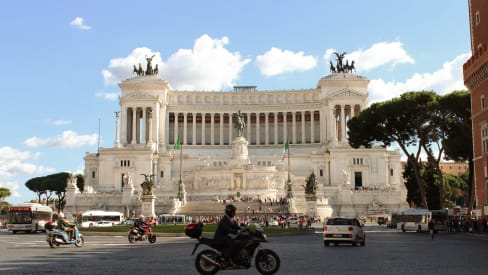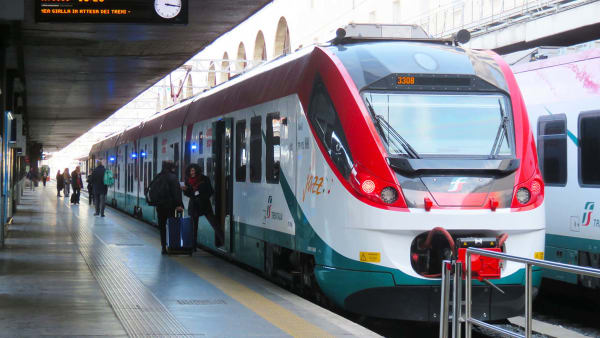Location and how to get there
Location and how to get there
Like many other squares in Rome, Piazza Venezia is located in the center of the city, and can therefore be reached by various means of public transportation , by cab or by foot.
By metro
Piazza Venezia isn’t far from the stop Colosseo on metro line B. Once the exit of the metro has been reached, you will only need to follow Via dei Fori Imperiali for 950 meters (12 minutes on foot), and you’ll reach Piazza Venezia, with the Vittoriano on your left.
A single ticket (B.I.T.) costs € 1.50, but the metro also offers tickets for 24, 48, or 72 hours or even for a week.
See more info about the Rome metro.
See details on tickets and subscriptions for public transportation in Rome.
By tram
As for the tram, Piazza Venezia has its own stop, by the same name, on line 8. Once you arrive at the stop, you’ll find yourself in front of Piazza San Marco, to the left of Piazza Venezia.
Rome’s tram network also uses the 1.50 euro single-ride BIT tickets, as well as other available passes.
See more info about the streetcar in Rome.
See details on tickets and subscriptions for public transportation in Rome.
By bus
This is definitely the means of transportation that offers the most options. The buses in Rome allow you to reach Piazza Venezia with several lines. The ones here indicated stop right in front or to the side of the square.
| Line |
|---|
| Closest stop |
| Itinerary |
| Line | 119 | 85 | 70 | 628 | 51 | 118 | 83 | 160 | 63 | 40 | 64 |
|---|---|---|---|---|---|---|---|---|---|---|---|
| Closest Stop* | Venezia | Piazza Venezia | Piazza Venezia | Piazza Venezia | Piazza Venezia | Piazza Venezia | Piazza Venezia | Piazza Venezia | Piazza Venezia | Piazza Venezia | Piazza Venezia |
| Itinerary | An almost circular route, starting from Piazza Venezia, going around Piazza del Popolo and then back to the terminal. | It links the Termini area to Piazza Venezia and the Colosseum. It extends to the south-east of Rome, to areas of little tourist interest. | It travels a short distance in the centre of Rome, from stops Clodio to Giolitti | It links two areas to the north and south of Rome, passing through the centre and following the course of the Tiber for a stretch. | It links the San Giovanni metro station to an area close to the Trevi Fountain, via Piazza Venezia. | Useful for visiting places of interest such as the Colosseum, Piazza Venezia, Circus Maximus, the Roman Forum and even the Baths of Caracalla. | It connects two areas outside the centre of Rome, from north-east to south, passing through the centre and stopping at Piazza Venezia. | It crosses Rome from north to south, linking Villa Borghese with Montagnola, and stopping at Piazza Venezia | Collega una zona esterna, nel nord-est di Roma con il centro, facendo capolinea in prossimità dell’Isola Tiberina. | It connects Termini Station with Castel Sant’Angelo, stopping at key points in the centre such as Piazza Venezia and Largo di Torre Argentina. | It connects Termini Station with the Vatican, crossing the centre of Rome on the way. |
The city buses use the same tickets that are also valid for the metro, trams, and suburban trains. The cost of a single bus ticket is therefore always €1.50 (BIT) and is valid for all other means of public transportation.
Find more info about buses in Rome.
See details about tickets and subscriptions for public transportation in Rome.
By taxi
Cabs are obviously the most comfortable option, but they are also the most expensive and are not guaranteed to be the fastest way to get to Piazza Navona due to the heavy traffic in the central area of Rome.
However, this means of transport is a good option if you feel like chatting with a cab driver, who can tell you a few secrets of the city or entertain you with his typical Roman humor.
The best way to get a cab in Rome is to book it by phone, mobile apps, or simply by going to a cab stand. For instance, there is a cab stand along the east side of the square.
By foot
Walking is undoubtedly the option that ensures you enjoy the monumental beauty of the Eternal City to the fullest. Fortunately, Piazza Venezia is close to many other interesting sites.
You could, for example, consider using the square as a transition point from a tour of Ancient Rome to one of Renaissance and Baroque Rome. The first tour would feature monuments and locations such as the Palatine Hill, the Arch of Constantine, the Colosseum, the Imperial and Roman Fora, while the second one would include Venice Palace, Piazza Navona, the Bridge and Sant’Angelo Castle, the Spanish Steps, and the Trevi Fountain.















